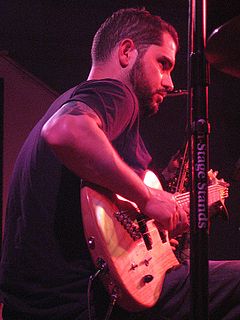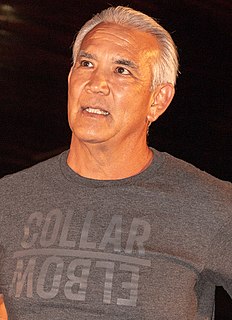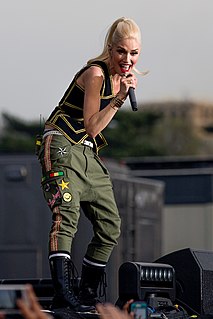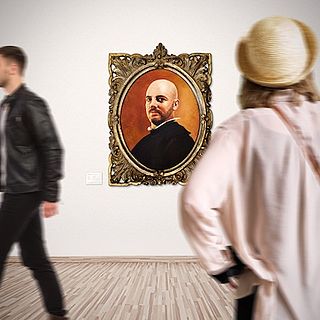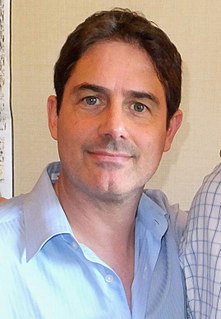A Quote by Todd Rundgren
It's never the same relationship. I see my job as filling in the blanks. Whatever it is that the artist lacks in the process of making a record, I'm supposed to fill that in. And sometimes it's a lot of stuff and I have to hector them about working on the material and that sort of thing. Sometimes you have an artist that's really fairly self-sufficient; they just need another ear to offer some objective criticism, but otherwise pretty much know what they're doing. It varies a lot.
Quote Topics
About
Another
Artist
Blanks
Criticism
Doing
Ear
Fairly
Fill
Filling
Filling In
Hector
Job
Just
Know
Lacks
Lot
Making
Material
Much
Need
Never
Objective
Offer
Otherwise
Pretty
Process
Really
Record
Relationship
Same
See
Self
Self-Sufficient
Some
Sometimes
Sort
Stuff
Sufficient
Supposed
Them
Thing
Varies
Whatever
Working
Related Quotes
I like auditioning. I like working on material. I just love working. I like the chance to work on material. Sometimes it helps to not be going into a room cold and to know people. I've spent a lot of years getting to know people in the business, and that really helps. It depends. You can have some pretty terrible auditions.
I take the palette with me, but I have a lot of makeup. I was a makeup artist when I was younger, but I'm not that good compared with my makeup artist, so I keep things pretty simple. I explore a lot with pink and nude lipsticks, but I love red lipsticks. I love a line and a lash and a brow. So I don't need a lot, but I have a lot. It's all there just in case - for Halloween or whatever.
Having people around you that are honest with you, and having a team around you that can actually track and communicate where things are working and where they're not working, is really an invaluable asset to an artist's career. I just see it time and again, people who have no clue about that stuff. It's frustrating, and I see the frustration for them. It's a weird thing being an artist, trying to navigate the music business with little to no help.
I think screenwriter Steve Kloves does such a difficult job. And he does a bloody brilliant job, too. Transferring these Harry Potter books into films and making them coherent is one thing. But making them entertaining, as well, is quite another... He does a tremendous job, and he gets a lot of stick. And it's really unfair sometimes, and I challenge anyone else to do the job he does.
Sometimes you're a psychiatrist and sometimes you're a group therapist. The dynamics in between people and the misgivings sometimes that artists have when they get into the studio because they're under a different level of scrutiny. A lot of them can be insecure about it. My job is not simply to make musical determinations but sometimes to just keep people from flipping out during the process.
The reasons you have for doing a movie will vary with the way your life is going. There was a time when a made a some movies because I felt I needed to work. And I didn't think about the material as much. But sometimes I've thought about the material a lot and thought I was doing the right thing, and it didn't work out.
Those titles, Executive Producer or actor, are unimportant. I always try to approach my role as an artist. The first thing you want to do, that you attempt to do as an artist, is to have some sort of input into the material that you are working on. That is how my process begins; I say to myself: "I want to do this kind of work or I want to do that kind of work."
If you put up a blog, people can cut out the middle man and get material to you. Which is really helpful because a lot of time there's really cool stuff out there that we just don't see. Because, y'know, the agent is acting in our best interest, but it does sometimes prevent some of the good stuff from getting through.
A lot of singers don't really know who they are. They have this massive insecurity and this massive ego and they are sort of pulled between both. I mean, why do you want a lot of people to look at you all the time and listen to you? There is something going on there, there is sort of need to express and attention. It's not just ego, it's some sort of complex thing and sometimes you create characters to say something you want to say and then you just throw yourself into that.
In a lot of movies, honestly, the directors don't talk to you that much. Maybe they say, "Faster, slower," whatever. Sometimes they give you little adjustments, because sometimes you want to start out neutral, but a lot of times you wind up directing yourself anyway, just doing what you think is the right thing to do.
I am an artist, and I understand the pros and cons of being an artist, and the pressures of being an artist, and how much being an artist can be torture to people around you; you know, you friends and your family and how material you can be, and how it's hard to take criticism and all the things like that.

